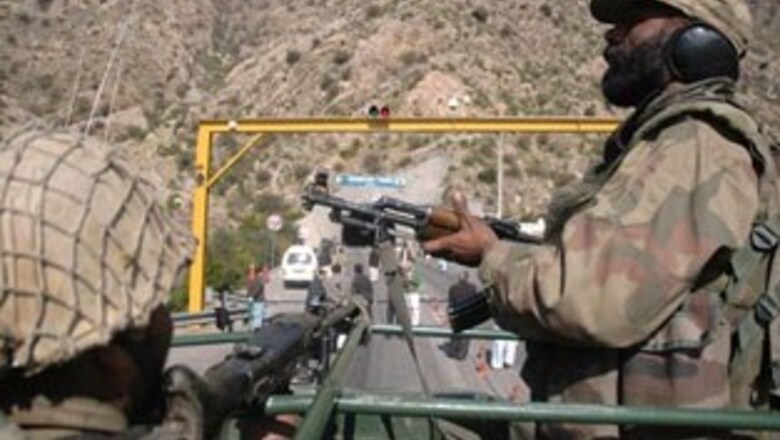
views
New Delhi: India is convinced of the central role played by Pakistan's army in Mumbai terror attacks, but has stopped short of blaming it openly.
Sources close to the Indian intelligence establishment are convinced that the conspiracy was hatched and executed at the Pakistani army headquarters but there was no proof to substantiate it.
Analysts who watch Pakistan closely express little doubt that the provocation was aimed at forcing India to attack Pakistan in order to swing popular opinion within the country in the army’s favour. Perhaps that is the reason why India has not played the blaming game, yet.
Six weeks after gunmen terrorized Mumbai, the Indian government continues to stop short of pointing a firm finger at Pakistan’s army and its spy agency Inter Services Intelligence (ISI) and say that they hatched the plot and directed the attack. The Indian establishment seems to be hoping for an improbable mea culpa from Pakistan which is living in denial about the role of its spy agency.
The wait looks to be a long one. And there is no help forthcoming from government officials either. Their statements are, as usual, couched in euphemisms. Sample this: At the beginning of the week, home minister P Chidambaram said: “No non-state actor can mount this attack without any kind of state help. It is too enormous a crime, required very elaborate preparations and very elaborate communications network and financial support and equipment.”
Preliminary investigation had made it clear that the young men who carried out the attack were from Pakistan. The confession of the lone gunman captured on Mumbai’s famous Queen’s Necklace and other damning material collected by investigators reinforced the fact.
There are three main reasons why the Pakistani military is seen to be behind this attack on India.
First, Pakistan was unhappy with the newly elected civilian government’s peace overtures to India and efforts to marginalize the military establishment. After coming to power, President Asif Ali Zardari had said that Pakistan would not be the first one to use nuclear weapons which was an about-turn from that country’s first-use-as-deterrent policy. Zardari also dismantled the ISI’s political wing, which was instrumental in propping up fundamentalist political parties. Second, it was worried about India’s increasing influence in Afghanistan, a country the Pakistani army and ISI consider their backyard. Third, the army was worried about India’s intensifying political and defence cooperation with Israel.
PAGE_BREAK
At a conference of chief ministers recently, Prime Minister Manmohan Singh came close to saying that with or without the knowledge of the civilian government, the Pakistani army had masterminded the attack. Accusing Pakistan-based Lashkar-e-Taiba for carrying out the attacks, Manmohan Singh said: “There is enough evidence to show that, given the sophistication and military precision of the attack, it must have had support of some official agencies of Pakistan.”
In an interview to a television channel, the Home Minister had hinted at the role of the army when he asked for guarantees from “those who control the levers of power, and that means the elected civilian Government, plus the Army”. He, however, went only thus far.
Even India's Foreign Secretary Shiv Shankar Menon stopped short of pointing out the real issue. “We are at the point where it is clear that the crime might have been committed in India but the conspiracy behind the crime was in Pakistan,” Menon told newspersons on Tuesday after handing over evidence to Pakistan.
The tough-talking bureaucrat, however, refused to speculate on where the material collected by Indian investigators may further lead. He said India had handed over the evidence and it was up to that country to follow the trail. Pakistan has since rejected the material.
PAGE_BREAK
While civilian governments in Pakistan have made some efforts off and on to normalise the country’s relationship with India, the army has never forgotten the humiliating defeat of 1971. After the war, it devised the strategy of bleeding India with a thousand cuts, which it pursues to this day. Over the years, the Pakistani army and the ISI has trained and equipped militants to infiltrate into Kashmir. The spy agency is believed to offer money, arms and training support routinely to home-grown terrorists in India. It is also supposed to have used terrorists to encroach into Kargil and set up positions there in the summer of 1999.
An analyst said that about 15 key people in the Pakistani military complex form the decision-making apparatus. “They include the army and ISI chiefs and corps commanders,” Executive Director of Institute for Conflict Management, Ajai Sahni said.
However, the Indian Government, so far, has been unable to use effectively the knowledge that the army and ISI in Pakistan have actively supported terrorism against India. After the Mumbai attacks, it has become even more important to publicize the point.
According to strategic affairs expert Ashley Tellis, “India should make more positive demands of Pakistan.” By positive demands, Tellis, senior associate at the Carnegie Endowment for International Peace, means that India should clearly tell its neighbour what are the specific things it wants it to do to build confidence.
He says now the Indian Government seems to be acting under the presumption that the civilian government is too weak to pull up the army and ISI, often described as a state within the state.
Over the past few days, India has stepped up the diplomatic pressure. By not falling into the trap of a military mobilisation, it effectively neutralised an excuse for Pakistani army to move its troops from its western border where it is fighting Al Qaeda and Afghan Taliban, to the Indian border. It is quite clear that India will not take any direct military action against Pakistan and would prefer to get the international community, especially America, to act on its behalf. That would mean playing a sophisticated diplomatic game in Afghanistan.
As Pakistani journalist and Afghan expert Ahmed Rashid says: “The Kashmir war is now being fought in Afghanistan.”
Dinesh Narayanan is Associate Editor at the new business magazine to be launched by Network18 in alliance with Forbes, USA
















Comments
0 comment